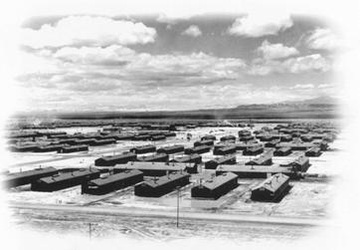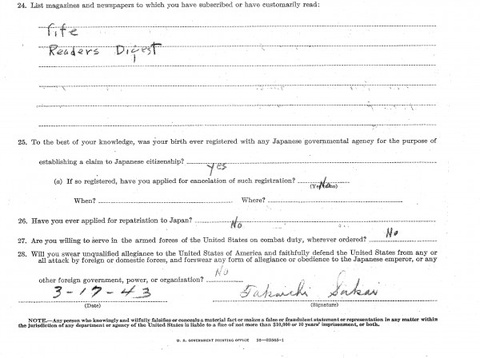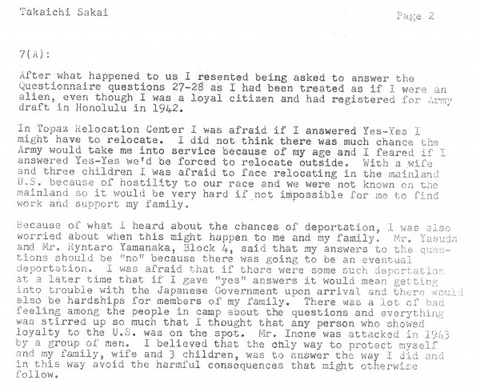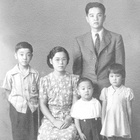In Part 1, my grandfather, Takaichi Sakai, was arrested and investigated by the FBI. An Internee Hearing Board in February 1943 ordered that he be “interned for the duration of the war.” A few weeks later, the Military Governor had him sent to a “relocation center” on the Mainland.
My grandmother, Sato Sakai, was given the opportunity to stay in Hawaii or accompany her husband to prison camps on the mainland. Her trouble with her in-laws, her inability to care for the family on her own, and her desire to keep everyone together, made the choice of going with my grandfather easy: they were all sent to Topaz, Central Utah.
In 1943, the United States government issued a loyalty questionnaire to many Japanese Americans. The two most infamous questions were questions 27 and 28.
(That might be difficult to read, so let me transcribe the questions for you below)
27: Are you willing to serve in the armed forces of the United States on combat duty, wherever ordered?
28: Will you swear unqualified allegiance to the United States and faithfully defend the United States from any or all attack by foreign or domestic forces, and forswear any form of allegiance or obedience to the Japanese emperor or any other foreign government, power, or organization?
Obviously, this was a very controversial questionnaire. American citizens were being asked if they were loyal based on nothing more than the fact that they happened to “look like the enemy.” Although most of the focus has always been on questions 27 and 28, I’d like to point out question 24, which asks, “List magazines and newspapers you have subscribed to or have customarily read.” What exactly the point of this question baffles me. As though the magazine one subscribes to is in any indication of your loyalty. Does my grandfather reading Readers Digest mean he’s a loyal citizen or disloyal? And if one was reading something questionable, would anyone be so stupid as to actually write it down?
Before my grandfather explains why he answered the loyalty questionnaire the way he did, I should give a little background. First, it is important to know that here were only two possible ways to answer questions: Yes Yes or No No. Not answering a question was considered a “no” answer. How you answered depended on a lot of factors. Many who answered “Yes Yes” did it to prove their loyalty to this country and answering the two questions affirmatively was one of the few ways they were able to. Many who answered “No No” did it on moral grounds. They argued that if you took them and their families out of the camp, they would answer “Yes Yes” but until that time, their answer is “No No.”
For many, 28 was a trick question. The assumption behind the question is that at one point you had disloyalty toward this country and are NOW pledging loyalty. Many were insulted because they NEVER had loyalty to Japan in the first place and didn’t want to imply that they ever did.
These two questions divided the community in the 1940s and continue to divide the community 70 years later. Those who answered “Yes Yes” often look at those who answered “No No” and think that they made the community look bad and gave justification for the illegal incarceration. However, for those who answered “No No” they look at those who answered “Yes Yes” as people who gave into the government and were not willing to fight for their equal rights.
My grandparents both answered “No No.” I always believed that the decision was a strictly moral one. However, reality always proves to be a little more complicated. His answers were partly moral but also very practical.
When asked why he “would not swear unqualified allegiance to the United States” this was my grandfather’s answer:
My grandfather’s answer makes a lot of sense to me. He was worried about his family. He was worried that he wouldn’t be able to care for them outside of camp. He was also worried that if he was deported (as he had heard that they were all going to be) the Japanese government wouldn’t look favorably upon those who had shown loyalty to the United States. And finally, he was worried about his safety in the community.
Even if I didn’t know all that, I don’t think I could fault him (or anyone else) for his decision to answer “No No” to the loyalty questionnaire. I wasn’t there. I have no right to judge people who answered yes or no. It was a crazy time and I think people made the decisions they thought were best for them and the people around them.
Knowing why my grandfather answered the way he did does give me a better sense of the inner turmoil he and the rest of my family must have been going through during that time. It makes me sad that any American citizen would have to fill out such a questionnaire and it makes me wonder what I would have done if I were in his shoes.
* This article was originally published on 8Asians.com on July 19, 2011.
© 2011 Koji Steven Sakai









